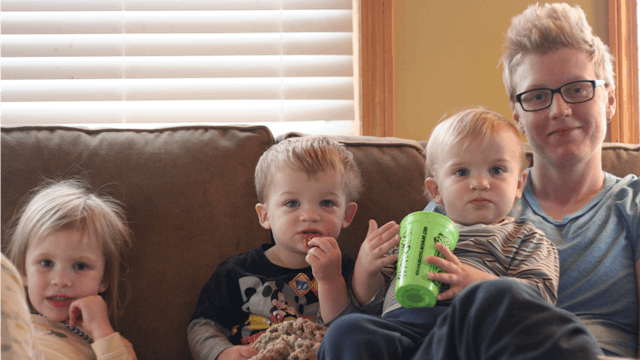The Not-So-Surprising Way A Second Kid Can Affect Parents

So when are you going to have another kid? Your kid needs a sibling. I wanna baby brother!
The pressure to have another child can be overwhelming. The assumption that another child is a possibility or even desired is a lot to combat even if you do want to have more than one. First of all, it’s nobody’s business if or when Baby #2 is going to come along. And secondly, giving your child a little sibling isn’t always what it’s cracked up to be. Let’s be honest, adding a new member adds lots of love and joy into a family, but a second child can wreak havoc on your mental health too.
A study published in the Journal of Marriage and Family proved what those of us who have more than one kid already know: Mothers feel pinched for time and our mental health suffers when we have another child.
“Children have a stronger effect on mothers’ than fathers’ experiences of time pressure,” the study found. “These differences are not moderated by changes in parental responsibilities or work time following births. The increased time pressure associated with second births explains mothers’ worse mental health.”
This conclusion after following 20,000 Australians for 16 years comes as no surprise to moms everywhere.
Having multiple kids is really fucking hard. And in a house that has two parents, going from a 2:1 ratio to 1:1 (or worse if you have multiples the second time around like I did) is like a kick in the head. The responsibilities and expenses increase. The physical and emotional demands of our children are suffocating. Yet, parents, mothers especially, expect themselves to do all of the things all of the damn time. We try to be good friends, spouses, parents, and children to our own parents. And we are trying to do it all with less time, more exhaustion, and a heavier mental load.
At a certain point it is just too much. Our anxiety kicks in, and we feel stressed and agitated. Depression seeps in. We feel like we are losing a bit of ourselves while taking care of others. We don’t feel appreciated or seen. We don’t feel like we are doing anything right. Our self-worth takes a hit and our mind tells us we are not enough. Time. We need time. There is not enough.
I will never forget the feeling of holding my daughter, the child that made me a parent, for the first time. My partner had labored for 24 hours, and as the sun started to brighten the morning sky on a cold February morning, the doctors handed my baby to me. My partner needed to have surgery to fix tears, and I was supposed to sit and hold my new baby. I did. I was delirious from lack of sleep and euphoric bliss. I couldn’t have been more in the moment. My baby was in my arms. I was finally a parent. I didn’t think I wanted anything else.
She was a pretty easy baby and toddler, and the idea of giving her a sibling seemed lovely. My partner and I naively anticipated more parental bliss by adding one more child. Instead, we added two when my partner gave birth to twins and I have been in survival mode ever since.
Some things are getting better as my kids get older. They can dress themselves and technically wipe themselves and get their own snacks. My oldest is a second grader and my twins are now kindergarteners; I am slowly regaining a sense of self now that they are all in school. But I had many breaking points over the last five years. I realized I wanted so much more.
Image via Amber Leventry
I was a stay-at-home/work-at-home mom with my twins for three years, and those years felt like I was drowning. Yet, I struggled to explain just how lonely and depressed I was. I had healthy and happy kids. I should be healthy and happy too, right? I mean, I wanted this after all. I was supposed to feel lucky to have so much time with them. I had wanted to be a parent, so I felt like I had to hide the feelings that told me I didn’t want to be a parent. I found solace in booze, online friends, and articles and groups that told me I wasn’t alone. I was afraid to admit that being a parent was too hard on most days.
On The Conversation, the study’s authors remind us: “Mothers cannot shoulder the time demands of children alone. Even when they reduce their work time to accommodate children’s demands, their time pressures do not ease. This has important consequences for their mental health.”
I am not at all shocked by the results of this study. Yet, it’s a reminder we all need. There is too much stigma around mental health issues. One out of seven moms experience postpartum depression. Anxiety and panic attacks are more common than people admit, and they are scary.
Being a parent is amazing, but it’s no joke. It’s okay to say you need help. It’s okay to need time to yourself. Talk to your spouse, your friends, and your doctor about the heavy and dark thoughts you carry. We know you still love your kids and love being a parent. But you need to take care of you too. You are worth it.
This article was originally published on